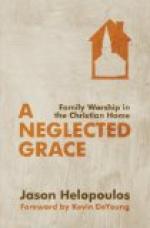Such unequal matches are not made in heaven. “God’s hand is over such matches, not in them.” “What fellowship hath light with darkness?” If love, in Christian marriages, is holy and includes the religious element, then it is evident that the Christian alliance with, one between whom and himself there is no religious affinity whatever, is not only an outrage against the marriage institution, but also exposes his home to the curse of God, making it a Babel of confusion and of moral antipathies.
Both the old and the new testaments give explicit testimony to the law of spiritual harmony in marriage. Thus the law of Moses forbid the children of Israel to intermarry among heathen nations. “Neither shalt thou make marriages with them; thy daughter thou shalt not give unto his son, nor his daughter shalt thou take unto thy son.”—Deut. vii., 3. Abraham obeyed this law in the part he took in the marriage of his son Isaac, as recorded in the twenty-fourth, chapter of Genesis. His obedience was reproduced in Isaac and Rebecca, who manifested the same desire, and took the same care that Jacob should take a wife from among the covenant people of God. See twenty-eighth chapter of Genesis.
The evil consequences of the violation of this law may be seen in the history of Solomon,—i. Kings, chap. 11; also in the case mentioned in the 10th chap.; and in Nehemiah, chap. 13. Paul upholds this law when he exhorts the Corinthians to marry “only in the Lord.” Reason itself advocates this law. The true Christian labors for heaven and walks in the path of the just; the unbelieving labor for earth, mind only the things of this world, and walk in the broad road to ruin. Can these now walk together, live in harmony, when so widely different in spirit, in their aims and pursuits? “What fellowship hath righteousness with unrighteousness? What part hath he that believeth with an infidel? And what agreement hath the temple of God with idols? for ye are the temple of the living God; as God hath said, I will dwell in them; and I will be their God, and they shall be my people. Wherefore come out from among them, and be ye separate, saith the Lord, and touch not the unclean thing; and I will receive you, and will be a father unto you, and ye shall be my sons and daughters.”
The primitive Christians developed this law in their families. They forbade marriage with Jews, Pagans, Mohammedans, and ungodly persons. With them, piety was the first desideratum in marriage. The sense of the Christian church has ever been against religious inequality in marriage. It has always been felt to be detrimental to personal piety and to the general interests of Christianity. It limits and neutralizes the influence of the church, brings overwhelming temptations to lukewarmness in family religion, and is, in a word, in almost every instance, the fruitful cause of spiritual declension wherever it is practiced.
Let me, then, exhort you to marry only in the Lord. Such an union will be blessed. Daughter of Zion! marry such a man as will, like David, return to bless his household. Son of the Christian home! marry no woman who has not in her heart the casket of piety. Make this your standard; and your home shall be a happy, as well as a holy home, and




